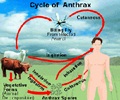Research Institute and The Salk Institute for Biological Studies have produced a virus-like particle that prevents infection against a dose of anthrax that would normally prove lethal.
US researchers from the Scripps Research Institute and The Salk Institute for Biological Studies have produced a virus-like particle that prevents infection against a dose of anthrax that would normally prove lethal. In experiments with rats, the scientists found that the vaccine, based on the Flock House insect virus, was able to prevent infection after just one dose.
The vaccine caused the animals' immune system to produce antibodies that later protected them by mopping up anthrax toxin elsewhere. The scientists say this is a step better than a two-dose nasal vaccine previously developed. The therapy acts both as a vaccine and a treatment.Studies further proved that in addition to protecting the rats against anthrax infection, the virus also proved effective in treating rats already infected with a potentially deadly dose. In this role, the unfilled receptors on the surface of the virus snatched toxin molecules before they could do too much damage. While all the treated animals survived, none of the untreated animals did.
The researchers speculate the particle's ability to display multiple copies of toxin receptors explains its potency. Vaccines currently in use require up to six doses to be administered, together with annual boosters. This complicated dosing procedure means full compliance is often poor, and increases the risks for those who require protection in difficult situations such as in conflict zones.
For people already infected, antibiotic treatment is effective – but only if given quickly enough. The researchers say the treatment might eventually be used in combination with antibiotics. “This recombinant virus-like particle represents a novel and highly effective, dually-acting reagent for treatment and protection against anthrax,” said team leader Anette Schneemann of The Scripps Research Institute.
“Clearly the US Government is keen to find a vaccine that requires fewer doses to boost compliance. One that acts as a medication could also be very useful. We'll need larger scale studies, though, to see how useful this new treatment actually is,” said Phil Luton, an anthrax expert at the UK's Health Protection Agency site in Porton Down.
The study appears in the journal PLoS Pathogens, reports New Scientist magazine.
Advertisement
LIN/V






